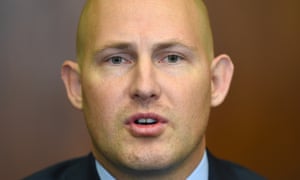A formerly secret report delivered to the Newman
government revealing sexual abuse and prostitution of
Indigenous children in far north Queensland is now public

Queensland’s minister for Aboriginal and Torres Strait Islander partnerships, Curtis Pitt,
said the decision to release a shocking report on child sexual abuse was difficult.
Photograph: Dave Hunt/AAP Australian Associated Press
Shocking claims of sexual abuse and prostitution involving Indigenous children in far north Queensland are merely the tip of the iceberg, researchers say.
The state government on Saturday released a redacted version of a document, commissioned by the Bligh government and compiled by Griffith University’s Prof Stephen Smallbone.
It examined three West Cairns suburbs and the Indigenous community of Aurukun, on the Queensland Cape, and found a disturbing prevalence of sexual abuse involving underage youth.
The rate of sexual offences in Aurukun was 6.6 times the Queensland average, and 2.2 times in West Cairns, over a 12-year period to 2012, according to police data.
One-quarter of the offences in West Cairns involved an offender who was under 18, and in Aurukun the offenders were aged between 10 and 53.
“These official data undoubtedly represent the proverbial tip of the iceberg,” the report said.
Researchers identified violence, substance abuse, a “disturbing frequency” of rape and sexual assault, street prostitution and a high rate of sexually-transmitted diseases (STI) as key problems in West Cairns.
Interviews in Aurukun “painted a perhaps even more disturbing picture”, than in West Cairns, the report said.
There, the STI prevalence was an “alarming” 56 times the Queensland rate, and 7% of cases involved children under 16.
Peer pressure, coercion, sexual teasing, violence, alcohol-related problems and the “nocturnal” nature of youth were all troubling, researchers noted.
Sound a bit familiar?
The report was delivered to the Newman government but was kept secret because the authors requested its release be delayed so as not to compromise the implementation of prevention efforts.
Its authors suggested various ways to tackle the complex problems, including school-based ethics programs, family-based interventions and cultural instruction.
The state’s minister for Aboriginal and Torres Strait Islander partnerships, Curtis Pitt, said the decision to release it publicly was difficult.
“Shying away from these challenges is clearly not an option and we want to have this conversation out in the open,” he said.
But Aurukun and West Cairns were not the only communities where such “deeply shocking” problems occurred, he added.
Pitt announced a specialist steering committee headed by Stanley Jones QC to examine the issue. It will report by the end of the year.
No comments:
Post a Comment